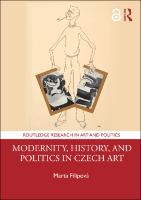Modernity, History, and Politics in Czech Art
Proposal review
Author(s)
Filipová, Marta
Collection
Knowledge Unlatched (KU)Language
EnglishAbstract
This book traces the influence of the changing political environment on Czech art, criticism, history, and theory between 1895 and 1939, looking beyond the avant-garde to the peripheries of modern art. The period is marked by radical political changes, the formation of national and regional identities, and the rise of modernism in Central Europe – specifically, the collapse of Austria-Hungary and the creation of the new democratic state of Czechoslovakia. Marta Filipová studies the way in which narratives of modern art were formed in a constant negotiation and dialogue between an effort to be international and a desire to remain authentically local.
Keywords
art and politics;art criticism;art history;art theory;Bohemia;Central Europe;Czechoslovakia;Czech art;economic change;exhibitions;exhibition history;Habsburg Monarchy;internationalization;modern art;museum studies;nationalism;national identity;nation building;nation-state;nineteenth century;political change;politics;regional identity;social change;twentieth centuryDOI
10.4324/9780429505140ISBN
9780429999024, 9781138585669, 9781032338224, 9780429505140Publisher
Taylor & FrancisPublisher website
https://taylorandfrancis.com/Publication date and place
2019Grantor
Imprint
RoutledgeSeries
Routledge Research in Art and Politics,Classification
The arts: general topics
History of art
Nationalism
Politics and government
European history
Museology and heritage studies


 Download
Download Web Shop
Web Shop